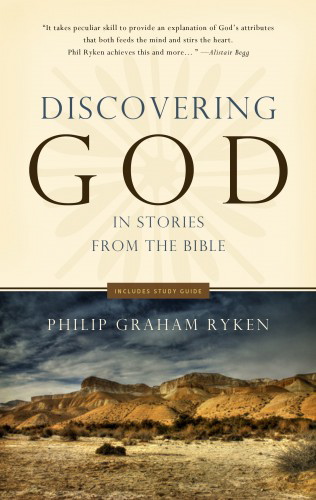
Philip Graham Ryken
Reviewed by: John Currie
Discovering God in the Stories from the Bible, by Philip Graham Ryken. Published by P&R Publishing, 2010. Paperback, 240 pages, list price $14.99. Reviewed by OP minister John Currie.
It was a book on the nature of God that first turned my theological and ministerial world on its head. Good books in that tradition appreciate that true and warm piety grows from the rich soil of theology proper. Philip G. Ryken's Discovering God in Stories from the Bible is such a book.
Ryken's intent is to use "stories of the Bible to teach the attributes of God" (p. 14). The opening chapter discusses God's glory, which the author defines as "not so much an attribute in itself as the sum of all God's attributes" (p. 17). The book then provides a chapter on each of the divine attributes identified in the fourth question of the Westminster Shorter Catechism, before concluding with a chapter on God's love. Each chapter consists of an explanation of a divine attribute, a biblical narrative in which the attribute is disclosed, a consideration of how that attribute is revealed through the person and work of Christ, and an application to life. Through this approach, Ryken combines systematic, biblical, and practical theology that consciously centers on Jesus Christ.
This pastoral agenda pervades the entire volume. Ryken's goal for the study is that "our theology becomes our doxology" (p. 14). Thus, the author brings each attribute to bear on real-life challenges. For example, he addresses God's omniscience through the story of Job and applies it to the experience of suffering with a blend of pastoral compassion and courage. Using the truth disclosed through Job, Ryken comforts those who are bruised and confronts our fallen instinct toward self-deification. This chapter would serve as a useful resource for someone who is struggling with suffering.
Another example is the chapter treating God's omnipotence, in which Ryken focuses on evangelism. He challenges the church's neglect of evangelism as a functional denial of God's power (pp. 123–14). He also encourages the reader in "the great paradox of Christian ministry: God's power flows through our weakness," so that "rather than asking God to make us strong … we should ask God to make himself strong through our weakness" (p. 124). Worship, comfort, and evangelism are just three of the pastoral outcomes from the knowledge of God set forth in this work.
This book's profound subject matter is accessible to a popular audience. Each chapter provides substantive material in a clear, coherent, and interesting style that moves easily from doctrinal reflection to historical quotation to illustration with real economy of language. This style and the included study guide will make this volume a profitable contribution to private and family worship or to a Sunday school or small group study. It will enlighten, enliven, and equip readers for action in the knowledge of the God, whose glory we confess to be our chief end.
July 27, 2025
July 20, 2025
July 13, 2025
Proclaiming Christ in a Pluralistic Age
July 06, 2025
June 29, 2025
June 22, 2025
June 15, 2025
© 2025 The Orthodox Presbyterian Church